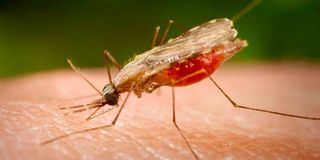Funding gaps, climate crisis stall malaria elimination in Africa

Anopheles mosquito. It is the main main vector for malaria. Africa bears nearly the entire global burden of malaria.
What you need to know:
- In 2023, Africa was home to 94 per cent of malaria cases (246 million) and 95 per cent (569, 000) of malaria deaths.
Increasing drug resistance, climate change, humanitarian crises, funding gaps and the spread of invasive mosquito species are some of the factors intensifying urban malaria transmission in Africa.
According to the African Leaders Malaria Alliance (ALMA), these challenges threaten to reverse years of progress in malaria control, putting millions of lives at risk.
“As urbanisation accelerates and environmental conditions change, malaria - once largely a rural disease - is emerging as a major urban health crisis,” warned ALMA.
One of the most pressing concerns, the Alliance warned, is the growing resistance of malaria parasites and mosquito vectors. Drug resistance weakens the effectiveness of antimalarial treatments, making it harder to treat and cure infections.
At the same time, mosquitoes are developing resistance to insecticides, undermining key prevention tools such as insecticide-treated nets and indoor residual spraying. This dual resistance complicates efforts to control malaria in urban areas, where densely populated environments create ideal conditions for rapid transmission.
In addition, climate change is exacerbating malaria transmission by altering weather patterns and creating conditions in which mosquitoes can thrive. Rising temperatures, increased rainfall and humidity accelerate mosquito breeding and allow them to spread into previously unaffected urban areas.
Warmer climates also accelerate the development of malaria parasites inside mosquitoes, leading to faster and more widespread transmission.
"We are seeing malaria creeping into areas where it has not traditionally been a problem, and unless we act quickly, we risk reversing years of hard work to control the disease,” the Alliance said.
Urbanisation, combined with humanitarian crises, is another key driver of the spread of malaria. Many African cities are expanding at a rate that outpaces infrastructure development, leading to inadequate drainage and poor sanitation. Stagnant water in urban areas creates ideal breeding grounds for mosquitoes.
In addition, overcrowded living conditions and limited access to healthcare make communities in informal settlements particularly vulnerable. Conflict and displacement exacerbate the problem as displaced populations are often forced to live in conditions that increase their exposure to malaria.
Another alarming development is the emergence of Anopheles stephensi, an invasive mosquito species that has been detected in 10 African countries, including Kenya. Unlike traditional rural malaria vectors, Anopheles stephensi thrives in the polluted water and man-made containers commonly found in cities, making it extremely difficult to control.
"If we do not act decisively, we could see malaria outbreaks in cities that were once considered low risk,” said ALMA.
"The fight against malaria is facing a perfect storm of converging crises that threaten to derail decades of progress against the disease. Member States face serious funding gaps due to the ongoing financial crises and declining donor resources; increasing levels of biological resistance, including drug and insecticide resistance; the adverse effects of climate change and humanitarian crises; invasive mosquitoes that threaten to increase urban malaria transmission; and a rapidly growing population at risk of malaria," said ALMA.
To address the growing threat of urban malaria, the Alliance stresses the need for a coordinated, multi-pronged approach. Strengthening surveillance systems is essential to track resistance patterns and detect outbreaks early.
At the same time, innovative vector control strategies such as the development of new insecticides and research into biological methods of mosquito control are critical to overcoming resistance. Improving urban infrastructure, including better drainage, sanitation and water management, can help eliminate breeding sites and reduce transmission risks.
The alliance adds that eexpanding access to effective malaria treatment and prevention services is critical, especially for vulnerable groups such as pregnant women and children. In addition, climate adaptation strategies such as environmental management and early warning systems could play a key role in reducing malaria risks associated with climate change.
However, these interventions require significant financial investment, yet funding gaps remain a major barrier to progress.
A review of the World Malaria Report 2022 found that countries and partners have only mobilised about 50 per cent of the estimated $7.3 billion needed globally to stay on track to defeat malaria. This shortfall threatens the sustainability of critical malaria interventions, particularly vector control.
"Beyond closing the immediate gap, we must work to fully secure the resources needed to end malaria once and for all,” said ALMA.
The consequences of inadequate funding could be devastating. The 2023 Africa Malaria Progress Report warns that unless urgent action is taken, there could be a resurgence in malaria cases and deaths, particularly among vulnerable populations.
"We face a budget gap of at least $1.5 billion just to maintain basic malaria services, especially vector control." Without increased effort and investment, malaria incidence and mortality could rise significantly by 2030, threatening to reverse decades of progress," the report said.
According to the World Health Organization, in 2023, Africa was home to 94 per cent of malaria cases (246 million) and 95 per cent (569 000) of malaria deaths.


